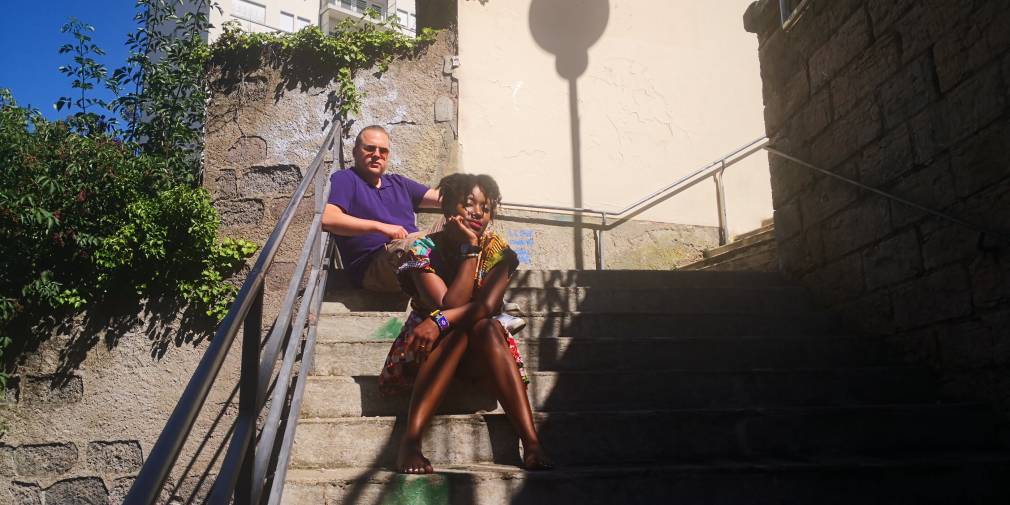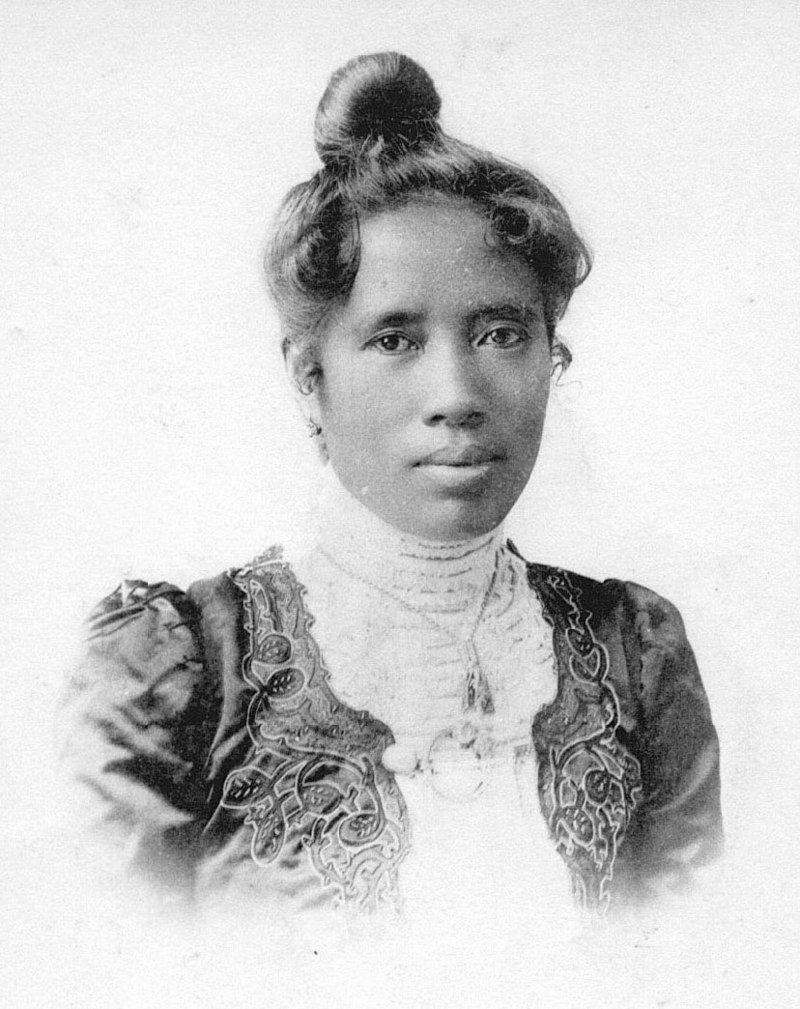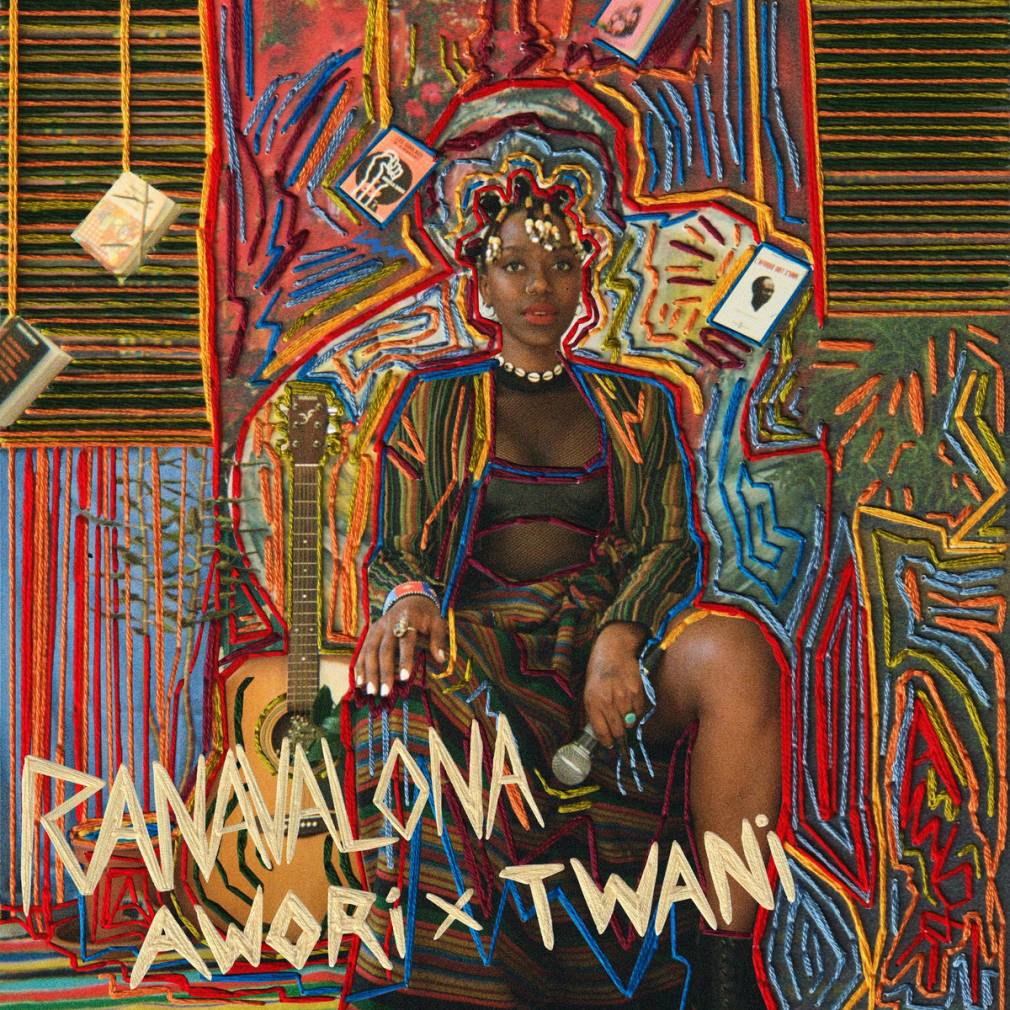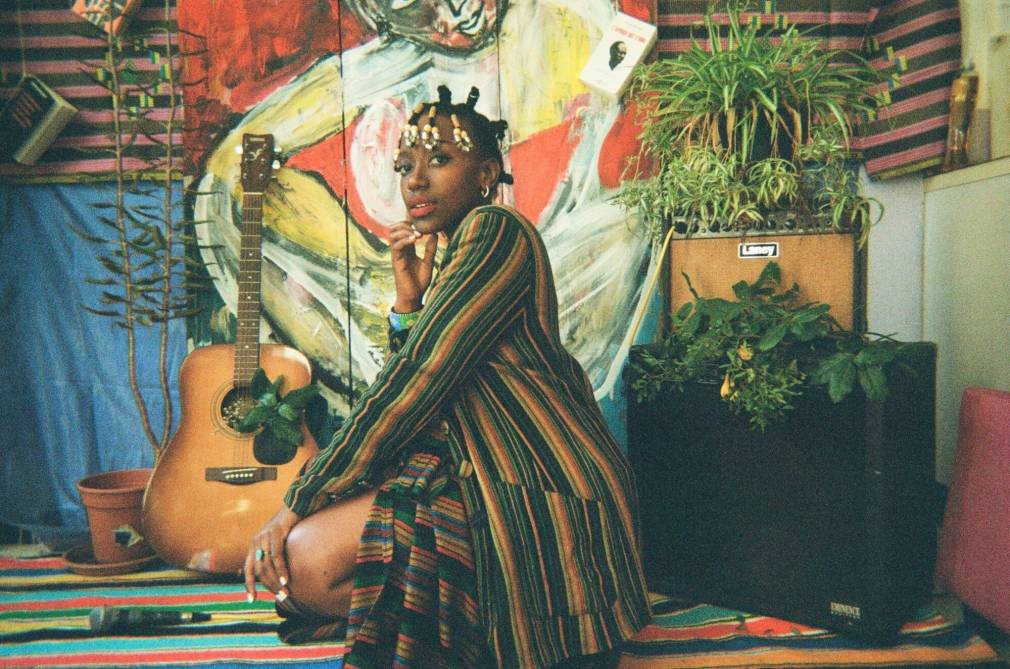Awori grew up in Uganda with her music-loving grandfather. Influenced by the music her parents listened to, from Miriam Makeba to Angelique Kidjo to Koffi Olomidé, she began singing at the age of eight, writing songs with her childhood best friend. Leaving her native country for Switzerland at the age of eleven, she began dabbling in poetry, before rapping her lines in order to entertain her older brothers, who introduced her to the lyrics of Notorious B.I.G., Tupac Shakur and Jay-Z. Awori’s love of hip hop led to an admiration of female hip hop artists such as Aaliyah and Erykah Badu. Once in high school she formed a blues-rock band with friends, and navigated the independent scene in Geneva, singing at street festivals as well as in school projects. Little by little, Awori forged a place for herself as a backing singer with professional artists.
As for Twani, his French upbringing was marked by new metal and punk rock until he discovered, completely by chance, the album Do You Want More?!!!??! by The Roots at his sister’s house. He then turned to hip hop, dove into J Dilla and D’Angelo before starting to buy equipment in 2007 and train himself in the noble art of production… As a technician within the radio program Métisphère, the producer slowly grew more and more interested in afro music, in all its diversity, until his ex-colleague, the journalist Mathieu Girod, introduced him to Awori. By 2019 and the Galant Records label got them involved in the Seeds project, which combines a singer and/or rapper with a producer for one dedicated track. Recorded in just one day, their first single “Cortex Iuxta” was released on November 27, 2019. Awori defines the chemistry as follows: “This experience was perfect in my eyes.” Twani also explains: “I was immediately hooked by Awori’s voice, her charisma.” Faced with so much enthusiasm, the label proposed that they make an album together, which has just been released: Ranavalona. Hear about it in their own words below.

Why did you choose to dedicate this album to the Malagasy queen, Ranavalona III?
Awori: I came across her story when researching African women who had participated in the anti-colonial struggles. I was looking for female figures in particular because the legacy of Pan-Africanism is usually focused on male figures, such as Thomas Sankara, Kwame Nkrumah, Amílcar Cabral… We sometimes forget the women who participated in this movement. They were women who fought physically, as well as intellectually.
I discovered Ranavalona III in the course of this research. She was the last queen of Madagascar. When the French arrived, she resisted them for several days. The Malagasy army tried to counter this invasion, in vain. France seized the castle, deposed the queen from her throne, and sent her to Reunion Island with her family in 1897. She was exiled yet France was still worried about her proximity to her home country, fearing a rebellion of the people.
So she was sent to Algiers. The local population knew that she was the queen of Madagascar and that France had seized her property. The Algerians were very sympathetic to her and tried to put pressure on the French authorities to grant her more resources as she was living in rather precarious conditions during her exile. She later went to Fontainebleau, where fashion houses offered her dresses. In 1917, she died in Algiers and twenty years later, her body was repatriated to Madagascar. In November 2020, France returned her crown, temporarily. She has held it for 123 years.
I think this queen fought in her own way, trying to preserve her culture and her people. I think that even though the story doesn’t have a happy ending, it’s okay, the struggle is also worth celebrating.
Do the struggles of this queen echo those in our own time?
Awori: Yes! It is true that today, there are many states that find themselves forced to make agreements, whether economic or political, especially in Africa, but also in other formerly colonized countries. These are arrangements that keep them in a perpetual domination and prevent them from truly emancipating themselves. People often talk about the poverty of Africa, but it is Africa that has been impoverished. It is precisely because it is not poor that it finds itself in this situation, because of goods such as gold, cobalt… If everyone has a smartphone today, it is thanks to the minerals of the Congo, where people perish because of the war. We must remember this. Our presidents stay in power for a long time by stealing money, thus depriving the population of international aid. Maybe the people would like the roads to be in better condition, to have enough food for everyone, to have free education… So yes, I think her story still echoes current struggles.
Is this album about promoting a kind of pan-African feminism?
Awori: I don’t know… I don’t know what to call it… Does it make it feminist because it has a woman on it? Pan-African anyway, I hope so, because it was my desire to touch on this history of Madagascar, which inspired me to find my own strength. I hope that it will make people who listen to the album want to learn about the history of this continent and all the women who contributed to pan-Africanism, like Bibi Titi Mohammed, Yaa Asantewaa and Titina Silà. I hope it is a pan-African project, or at least a project that makes people interested in Pan-Africanism.

Can we promote Pan-Africanism while living outside of Africa?
Awori: Oh yes! It is very important because Pan-Africanism is a movement that was born in the African and Afro-descendant diasporas, outside of Africa, in fact! In the Caribbean, in London too, with Pan-African commissions. In the UK, there is a large Caribbean community – many people used to get together regularly for sort of pan-African conferences. The diasporas really gave birth to this movement, the aim was to create solidarity outside the continent, but also political awareness in relation to Africa and the lands of origin. Pan-Africanism is not only about Africa. The goal is really to understand how we can still have a role to play, even if we aren’t living in the country of origin.
For example, in my country, Uganda, the President of the Republic, Yoweri Musevini, has been in power since 1986. This is a very long time and he uses considerable repressive policies, mobilizing the army and the police in order to censor the voices of the opposition. This is not a unique case. During the last presidential election, last January, social networks were completely blocked. You could not use Instagram, Whatsapp, or Twitter. Why? Because these are channels that the population uses in order to spread information about what is happening and to criticize, as well. What helped during this internet blackout, which is still very limited today, were the Ugandan diasporas around the world. Using Facebook, Instagram, and Twitter, to say: “Hey there’s something going on back home, we can’t speak freely.”
International solidarity is a very valuable weapon because our leaders, whether they like it or not, need to look good to the rest of the world, so as to not have the UN knocking on the door and saying: “Hey, human rights are not being respected.” So you can affect real power relations, no matter where you are. You always have to be careful about your own safety, for example by remaining anonymous. Someone like Twani, for example, if he broadcasts what’s going on in Uganda to his own network, that helps a lot. He can help me in this process. So yes, you can be pan-African, no matter where you live, as long as you believe in the economic and political emancipation of Africa.
Awori, we know how politically-engaged you are. Do you draw links between this aspect of your life, and your music?
Awori: Yes, but a really personal link. Madagascar is the East Coast, it’s East Africa and within this part of the continent, all the way to the south, we are very linked in our cultures, our languages, our food, our habits… This is also a part of pan-Africanism: to ignore the borders that have been drawn because, in the end, we did not create them. My approach is to make people understand that our destinies are linked. If we are able to do something here, it is because someone else has to pay the price. The story of Ranavalona III illustrates the importance of individual, but also collective, duties to unite and take care of each other. As long as one part of us is not free, no one is free. We must also apply this to our daily lives, keep this critical sense in everything we do. It’s very personal, maybe it links a little bit with politics. But I’m not in a feminist association anymore, even if I support a lot of initiatives coming from this movement. My song “Viscera” evokes the collective struggle and the duty to fight together for the liberation of everyone.
Twani, is it also important for you to evoke all these fights?
Twani: I am very sensitive to Awori’s speech, to what she represents and to what she can pass on as a message, and have been since the beginning. It was a motivating factor in doing this album with her. It’s true that I don’t experience racism on a daily basis, there are many things that I don’t experience.
But one thing is sure (he addresses Awori): all the fights you engage in are really worth going above and beyond for. In this album, I wanted to set up an environment that would be conducive to the appreciation of your message, to make it accessible to the public, that’s why I went into grime, dub, reggae, because I believe the rhythms and tempos are danceable as well as deeply meditative. When I see Sound System and that it is gone, that we all dance at the same time, in the same rhythm, we are all together, in the same atmosphere, everything is arranged for peace and engagement and as such, we can escape and concentrate on the MC’s message.
Awori: It allows for sublimation, yes yes.
“Hold Me” is a track with real vulnerability. Were you inspired by your own experiences in love?
Awori: The lyrics are inspired by my own experiences with vulnerability. I was raised by a woman who told me since I was a child that you have to be independent, to not depend on any man. When you hear that and you get into a relationship, for example, you keep a notion of: “Yes, we are in a relationship but don’t worry, I can manage myself.” It’s: “You’re here but I don’t need you.” It was quite an exercise to question what my mother had taught me, following her own experiences and difficulties in love. We don’t necessarily experience the same things.
At the end of the day, being independent in love leads us to place distances between ourselves and others, to not show our faults or ask for help… We cannot live like that, we are social beings and we need others to exist, we need to be helped because there are moments when we are just lost. We don’t know what to do and others have that knowledge. You need these exchanges to be vulnerable.
For me, vulnerability is really a strength, because it requires courage to go towards the other person, not being afraid of his or her judgement, well, perhaps being afraid of his or her judgement, but nevertheless showing ourselves as we are and saying: “Never mind.” For me, it is from moments of vulnerability that we build things because we can say to another person: “I need you.” And they will say: “Okay, I’m here.“
What do you think, Twani?
Twani: I don’t see it any differently in a relationship. If you don’t give yourself away completely, you can’t trust completely either.
Awori: Yes, and in all relationships, whether they are romantic or friendly.
Awori and Twani’s album was released on March 5, via Galant Records.
Check out the duo on our Songs of the Week playlist on Spotify et Deezer.





